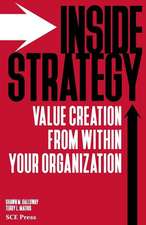The Power of Appreciative Inquiry: A Practical Guide to Positive Change
Autor Diana Whitney, Amanda Trosten-Bloomen Limba Engleză Paperback – 16 apr 2010
| Toate formatele și edițiile | Preț | Express |
|---|---|---|
| Paperback (2) | 203.47 lei 3-5 săpt. | |
| McGraw Hill Education – 16 apr 2010 | 203.47 lei 3-5 săpt. | |
| ReadHowYouWant – 19 aug 2011 | 359.04 lei 6-8 săpt. |
Preț: 203.47 lei
Nou
Puncte Express: 305
Preț estimativ în valută:
38.95€ • 42.32$ • 32.74£
38.95€ • 42.32$ • 32.74£
Carte disponibilă
Livrare economică 31 martie-14 aprilie
Preluare comenzi: 021 569.72.76
Specificații
ISBN-13: 9781605093284
ISBN-10: 1605093289
Pagini: 288
Ilustrații: Illustrations
Dimensiuni: 154 x 230 x 20 mm
Greutate: 0.45 kg
Ediția:2 Rev ed.
Editura: McGraw Hill Education
Colecția Berrett-Koehler Publishers
Locul publicării:United Kingdom
ISBN-10: 1605093289
Pagini: 288
Ilustrații: Illustrations
Dimensiuni: 154 x 230 x 20 mm
Greutate: 0.45 kg
Ediția:2 Rev ed.
Editura: McGraw Hill Education
Colecția Berrett-Koehler Publishers
Locul publicării:United Kingdom
Cuprins
Foreword by David Cooperrider
Chapter 1: What is Appreciative Inquiry
Chapter2: A Menu of Approaches to Appreciative Inquiry
Chapter3: Eight Principles of Appreciative Inquiry
Chapter4: Appreciative Inquiry in Action: From Origins to Current Practice
Chapter5: Getting Started
Chapter6: Affirmative Topic Choice
Chapter7: Discovery: Appreciative Interviews and More
Chapter8: Dream: Visions and Voices of the Future
Chapter9: Design: Giving Form to Values and Ideals
Chapter10: Destiny: Inspired Action and Improvisation
Chapter11: Why Appreciative Inquiry Works
Chapter 1: What is Appreciative Inquiry
Chapter2: A Menu of Approaches to Appreciative Inquiry
Chapter3: Eight Principles of Appreciative Inquiry
Chapter4: Appreciative Inquiry in Action: From Origins to Current Practice
Chapter5: Getting Started
Chapter6: Affirmative Topic Choice
Chapter7: Discovery: Appreciative Interviews and More
Chapter8: Dream: Visions and Voices of the Future
Chapter9: Design: Giving Form to Values and Ideals
Chapter10: Destiny: Inspired Action and Improvisation
Chapter11: Why Appreciative Inquiry Works





















